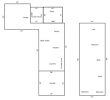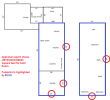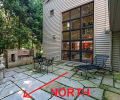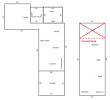HomeBuyer6
Freshman Member
- Joined
- Sep 16, 2021
- Professional Status
- General Public
- State
- Ohio
This post concerns an apparent discrepancy in square footage for a property I'm trying to close on 9/30, in Cleveland, Ohio. The appraisal already came in slightly above the closing price, which I'm happy about. However, I have a concern, detailed below.
The seller's original listing had the property listed at 3,640 square feet. The appraisal that I ordered came in at 3,336 square feet, about a 8.4% reduction. However, the drawing that the appraiser used to justify this calculation seems problematic to me, as this second figure STILL seems too high. I show the drawing here, taken directly from the appraisal report:

Note that the eastern portion of the house is shown to have an identical footprint for both floors:

This would be accurate if the second floor extended over the entire first floor. In reality, however, a large portion of the first floor is not covered by the second. The view through the northern window shows that the second-floor loft does NOT extend to the north wall:

A photo of the interior copied from the appraisal report shows the same gap:

In my mind, an accurate portrayal of the floor plans should take into account this gap, as follows:

I read in ANSI Z765-2020: Square Footage that "openings to the floor below cannot be included in the square footage calculation." I am worried that I am trying to buy a property listed at 3640 square feet which should be listed at about 3000 square feet (by my best estimate). I am especially concerned about how this will play out when I try to sell later. Can someone give me an objective third-party view as to whether this is an issue that needs to be cleared up?
Thank you in advance.
The seller's original listing had the property listed at 3,640 square feet. The appraisal that I ordered came in at 3,336 square feet, about a 8.4% reduction. However, the drawing that the appraiser used to justify this calculation seems problematic to me, as this second figure STILL seems too high. I show the drawing here, taken directly from the appraisal report:

Note that the eastern portion of the house is shown to have an identical footprint for both floors:

This would be accurate if the second floor extended over the entire first floor. In reality, however, a large portion of the first floor is not covered by the second. The view through the northern window shows that the second-floor loft does NOT extend to the north wall:

A photo of the interior copied from the appraisal report shows the same gap:

In my mind, an accurate portrayal of the floor plans should take into account this gap, as follows:

I read in ANSI Z765-2020: Square Footage that "openings to the floor below cannot be included in the square footage calculation." I am worried that I am trying to buy a property listed at 3640 square feet which should be listed at about 3000 square feet (by my best estimate). I am especially concerned about how this will play out when I try to sell later. Can someone give me an objective third-party view as to whether this is an issue that needs to be cleared up?
Thank you in advance.
Last edited:

